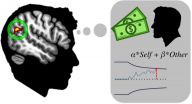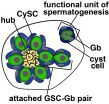(Press-News.org) A new computational model of how the brain makes altruistic choices is able to predict when a person will act generously in a scenario involving the sacrifice of money. The work, led by California Institute of Technology scientists and, appearing July 15 in the journal Neuron, also helps explain why being generous sometimes feels so difficult.
The reason people act altruistically is well contested among academics. Some argue that people are innately selfish and the only way to override our greedy tendencies is to exercise self-control. Others are more positive, believing that humans naturally find generosity rewarding and that we only act selfishly when we pause to think about it. The Caltech model suggests that neither side fits all; both generosity and selfishness can be fast and effortless. But it depends on the person and the context.
"We take a very simple model of choice that's been developed for predicting perceptual decisions--like whether a dot is moving left or right--and adapt it to capture generosity," says lead author Cendri Hutcherson, who did the work as a postdoctoral fellow at the California Institute of Technology and now directs the Decision Neuroscience Lab at the University of Toronto. "With this simple model, we are able to explain a huge host of previously confusing patterns about how people make altruistic choices."
"We find that what matters is not whether you can exert self-control, but simply how strongly you consider others' needs relative to your own," she says. "If you consider the other person's needs more, being generous feels easy. If you consider yourself more, generosity requires a lot of effort."
Hutcherson also thinks the model sheds light on debates about whether the mere act of behaving generously is rewarding. "Researchers have observed that if you act generously then you see greater activity in areas of the brain that represent reward value, and so have concluded that generosity is an inherently rewarding act--but our model actually suggests that you can get that activity just because of the way these regions construct a decision," she says. "You would see more activation in reward areas simply because the decision is complex and so requires more processing to make."
The model is based on brain scans of 51 males as they made decisions in a modified version of the "Dictator Game." To play this game, each participant was paired up with a stranger he would never meet and asked whether he would be willing to sacrifice different amounts so that the stranger could get a significantly larger pay-out (e.g., lose $25 and the other person receives an extra $100). The money was real and each participant had to make a total of 180 decisions.
The brain scans suggested that different brain areas represent one's own and others' interests. Self-oriented values correlated with activity in the ventral striatum, an area linked to basic reward processing. Other-oriented values correlated with activation of the temporoparietal junction, which has been implicated in empathy. Hutcherson believes this is evidence that people are more likely to give away resources if they already have in mind how their donation will benefit someone else.
Perhaps unsurprisingly, most people tended to be greedy, but the model also explains another puzzle: sometimes even the most selfish participants at times made generous decisions. The researchers see these choices not as evidence of self-control, as previously thought, but simply mistakes, a moment in which the benefit for the self was accidently underweighted. These errors suggest that time pressure could be one way to get people to behave out-of-character of their normal giving behaviors, but this is likely not a successful long-term strategy for fundraising.
"Our results indicate that people are happier when mistaken generosity doesn't happen." Hutcherson says. "But if we can increase people's focus on the thoughts and experiences of others, we can decrease those mistakes while increasing charitable giving and making altruism feel a lot easier."
INFORMATION:
This research was supported by the National Science Foundation, the Gordon and Betty Moore Foundation, and the Lipper Foundation.
Neuron, Hutcherson et al.: "A Neurocomputational Model of Altruistic Choice and Its Implications" http://dx.doi.org/10.1016/j.neuron.2015.06.031
Neuron, published by Cell Press, is a bimonthly journal that has established itself as one of the most influential and relied upon journals in the field of neuroscience and one of the premier intellectual forums of the neuroscience community. It publishes interdisciplinary articles that integrate biophysical, cellular, developmental, and molecular approaches with a systems approach to sensory, motor, and higher-order cognitive functions. For more information, please visit http://www.cell.com/neuron. To receive media alerts for Neuron or other Cell Press journals, please contact press@cell.com.
WASHINGTON, DC - July 15, 2015 - For decades, researchers have worked to improve cacao fermentation by controlling the microbes involved. Now, to their surprise, a team of Belgian researchers has discovered that the same species of yeast used in production of beer, bread, and wine works particularly well in chocolate fermentation. The research was published ahead of print July 6th in Applied and Environmental Microbiology, a publication of the American Society for Microbiology.
"Chemical analyses as well as tasting the chocolate showed that the chocolate produced with ...
LAWRENCE -- American media in effort to highlight a diverse set of voices in covering politics generally over-represent the amount of people who contribute to policy making when compared with journalists in South Korea.
A University of Kansas researcher made the findings as part of a recent study that examined how government officials were treated in front-page news coverage between the two free-press nations. The article by Jiso Yoon, a KU assistant professor of political science, and co-author Amber Boydstum, an assistant professor of political science at the University ...
AURORA, Colo. (July 15, 2015) - Physicians at the University of Colorado School of Medicine on the Anschutz Medical Campus have published research that suggests a safe and lower-cost way to diagnose and treat problems in the upper gastrointestinal tract of children.
The researchers assessed the effectiveness of unsedated transnasal endoscopy (TNE) in evaluating pediatric patients with potentially chronic problems in their esophagus, which is the tube that connects the patient's mouth to the stomach. The research team included Joel A. Friedlander, DO, MA-Bioethics, Jeremy ...
The human genome encodes roughly 20,000 genes, only a few thousand more than fruit flies. The complexity of the human body, therefore, comes from far more than just the sequence of nucleotides that comprise our DNA, it arises from modifications that occur at the level of gene, RNA and protein.
In a new study, researchers from the University of Pennsylvania School of Veterinary Medicine show how one of these modifications, which occurs after RNA is translated into proteins, has the power to greatly influence the function of an enzyme called PRPS2, which is required for ...
Athens, Ga. - Researchers from the University of Georgia have determined that various freshwater sources in Georgia, such as rivers and lakes, could feature levels of salmonella that pose a risk to humans. The study is featured in the July edition of PLOS One.
Faculty and students from four colleges and five departments at UGA partnered with colleagues from the Centers for Disease Control and Prevention and the Georgia Department of Public Health to establish whether or not strains of salmonella exhibit geographic trends that might help to explain differences in rates ...
DURHAM, N.C. - Children with even mild or passing bouts of depression, anxiety and/or behavioral issues were more inclined to have serious problems that complicated their ability to lead successful lives as adults, according to research from Duke Medicine.
Reporting in the July 15 issue of JAMA Psychiatry, the Duke researchers found that children who had either a diagnosed psychiatric condition or a milder form that didn't meet the full diagnostic criteria were six times more likely than those who had no psychiatric issues to have difficulties in adulthood, including ...
Children with psychiatric problems were more likely to have health, legal, financial and social problems as adults even if their psychiatric disorders did not persist into adulthood and even if they did not meet the full diagnostic criteria for a disorder, according to an article published online by JAMA Psychiatry.
Neuropsychiatric disorders among young people ages 10 to 24 are a leading cause of disease burden globally. Unlike many chronic physical health problems, most psychiatric disorders are first diagnosed in childhood, which allows the disorder to affect a person's ...
PHILADELPHIA - Stem cells are key for the continual renewal of tissues in our bodies. As such, manipulating stem cells also holds much promise for biomedicine if their regenerative capacity can be harnessed. However, understanding how stem cells govern normal tissue renewal is a field still in its infancy.
Researchers at the Perelman School of Medicine at the University of Pennsylvania are making headway in this area by studying stem cells in their natural environment in an organism. Stem cell populations reside in areas called niches deep within different types of organs. ...
States with more restrictive alcohol policies and regulations have lower rates of self-reported drunk driving, according to a new study by researchers at the Boston University schools of public health and medicine and the University of Minnesota School of Public Health.
The research team assigned each state an "alcohol policy score," based on an aggregate of 29 alcohol policies, such as alcohol taxation and the use of sobriety checkpoints. Each 1 percentage point increase in the score was found to be associated with a 1 percent decrease in the likelihood of impaired driving, ...
Final results of the randomized intergroup EORTC, LYSA (Lymphoma Study Association), FIL (Fondazione Italiana Linfomi) H10 trial presented at the 13th International Conference on Malignant Lymphoma in Lugano, Switzerland, on 19 June 2015 show that early FDG-PET ( 2-deoxy-2[F-18]fluoro-D-glucose positron emission tomography) adapted treatment improves the outcome of early FDG-PET-positive patients with stages I/II Hodgkin lymphoma.
Dr. John Raemaekers of the Radboud University Medical Center Nijmegen and the Rijnstate Hospital Arnhem, The Netherlands, and EORTC principal ...

